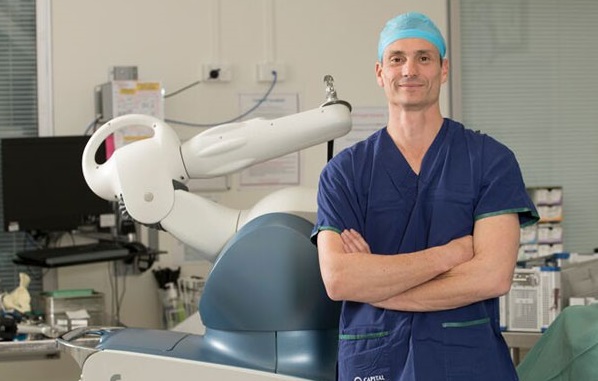
Orthopaedic surgeon Dr Damian Smith is now offering an Enhanced Recovery Joint Replacement program in Canberra. Photo: InMotion Orthopaedics.
Healthy patients can expect to go home just one or two days after knee or hip replacement surgery following the introduction of an Enhanced Recovery Joint Replacement (ERJR) program in Canberra.
Orthopaedic surgeon Dr Damian Smith and his team from InMotion Orthopaedics and Physiotherapy are working with hospitals to offer patients the short-stay option.
Dr Smith says patients are keen to get home to their families and their own beds following surgery, and the new program provides them with that opportunity.
Two Canberra patients have already been through the pilot program, coming out the other side with a new lease of life.
Dr Smith says with good preoperative preparation and postoperative support, healthy patients can be discharged from hospital the day after surgery and begin their road to recovery.
“Patient preparation, communication and a great medical and family support network is crucial to the success and optimisation of care,” he says.
“We hold sessions with patients before surgery, which includes preoperative conditioning and strengthening exercises, education and familiarisation with mobility aids.
“The day after the operation, the patient is assessed and, if they are ready and want to go home, they will be fully prepared mentally and physically, and will know what they need to do, such as exercises and using crutches.”
Dr Smith says communication with all parties is essential, and his team has been working closely with hospitals to develop the program, which is being rolled out in Canberra this month.
“Underpinning the success of these programs is the involvement and communication of a multidisciplinary team, including the surgeon, the anaesthetist, allied health, hospital admissions and nurses,” he says.
With waiting lists growing and more people seeking joint replacements, the short-stay program will benefit patients, as well as reducing health costs to the broader community.
According to the Australian Orthopaedic Association National Joint Replacement Registry, there were more than 51,000 total hip replacements and more than 66,000 total knee replacements carried out in 2019, and Dr Smith says, with an ageing population, demand for these procedures is expected to increase.
He says advances in surgical techniques, anaesthetics and optimisation of pain management has enabled the development of ERJR programs which “aim to improve patient recovery and minimise complications from prolonged hospital stay”.
“Several studies have shown no significant difference in complication or readmission rates with short-stay replacement surgery,” says Dr Smith.
“One study showed a 50 per cent reduction in minor complications and no difference in major complications to traditional longer hospital stay joint replacement programs.”
However, not all hip and joint replacement patients will be eligible for the short-stay option.
They must not have any significant co-morbidities or physical or mental health conditions that would prevent early mobilisation; they must have a body mass index (BMI) below 40; and must have a suitable home environment, which includes being close to a hospital, and having a relative or friend available to assist with care.
Dr Smith says patients opting for ERJR will not be “shunted out the door” after surgery. They can leave hospital when they feel confident.
The program doesn’t change the cost for private hospital patients, and Dr Smith believes it could reduce public health costs as well as waiting lists if it is rolled out to public hospitals in the future.
To find out more about the Enhanced Recovery Joint Replacement program, contact the team at InMotion Orthopaedics.












